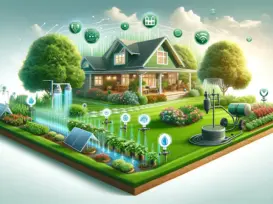Grus Home Energy - smart gardening practices
Revolutionize Your Green Space: Smart Gardening Practices for Modern Homes
Revolutionize Your Green Space: Smart Gardening Practices for Modern Homes
In recent years, the concept of smart gardening has taken root among gardening enthusiasts and environmentalists alike. Smart gardening is the amalgamation of technology and traditional gardening practices to create more efficient, productive, and sustainable gardens. In a world where time is precious, and environmental concerns are at the forefront, smart gardening provides an ideal solution for modern homeowners who wish to embrace nature without compromising on convenience.
One of the cornerstones of smart gardening is the use of intelligent watering systems. These systems can be programmed or operate via sensors to provide the precise amount of water plants need. Not only does this prevent overwatering and underwatering, but it also conserves water – a critical resource in many regions. Furthermore, with the integration of weather data, smart irrigation can adjust schedules based on rainfall predictions, thereby saving on water bills and ensuring plants remain healthy.
Another essential aspect of smart gardening is soil monitoring. Various smart devices are available that can check soil moisture, pH levels, and nutrient content. This information allows gardeners to make informed decisions about watering, fertilizing, and even what types of plants may thrive in their garden. By having real-time data, gardeners can optimize the growing environment, leading to healthier plants and better yields.
The advent of smart plant sensors and gardening apps has made it easier to keep track of plant health and growth. These sensors can monitor light levels, temperature, and humidity, all of which can affect a plant’s well-being. The apps provide a platform to log and analyze this data, often giving tips and alerts to gardeners. This can be particularly useful for those who are new to gardening or those who struggle to maintain their plants’ health.
Even pest control has seen the benefits of smart technology. Eco-friendly and non-invasive methods, such as ultrasonic repellents and smart traps, have become more prevalent. These devices can deter or capture pests without the need for harsh chemicals, protecting both the garden ecosystem and the broader environment.
Smart gardening extends to plant selection and garden design. With access to a wealth of online resources, gardeners can plan their gardens to include native species that require less maintenance and are better suited to the local climate. Additionally, companion planting can be optimized using databases that suggest which plants benefit each other through pest control or nutrient sharing.
The use of renewable energy has found its way into smart gardening through solar-powered lights and garden accessories. These sustainable options not only reduce the garden’s carbon footprint but also offer convenience and cost savings in the long term. Moreover, with smart outdoor lighting systems, gardeners can control the ambiance and safety of their green spaces with the touch of a button or a voice command.
Lastly, community and urban gardening initiatives have embraced smart gardening practices to maximize limited space and resources. Vertical gardens, hydroponic systems, and community-shared tools are just a few examples of how smart gardening can foster a sense of community and make gardening accessible to a broader audience.
Smart gardening practices are reshaping the way we approach our relationship with nature. By leveraging technology, we not only enhance the beauty and productivity of our gardens but also contribute to a more sustainable and environmentally friendly world. As we continue to innovate, smart gardening will undoubtedly continue to evolve, offering new ways to cultivate our green spaces with efficiency and ease.
©2025 All Rights Reserved. Grus IoT Co.,Ltd.
